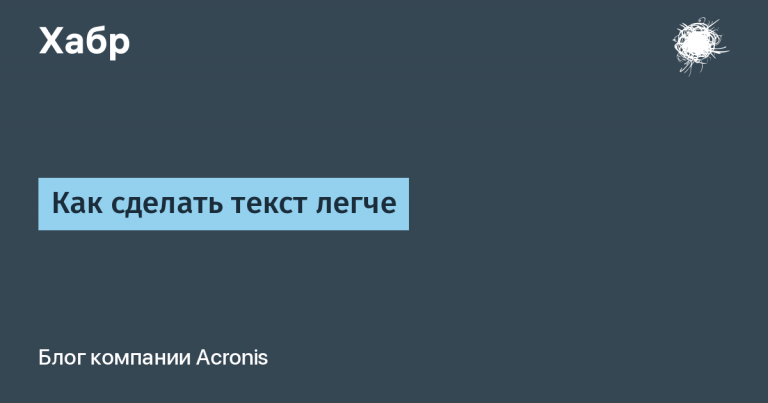How I ate a dog who loves phone calls
Friends, hello! My name is Egor Pakhomov, I have been working at Alpha for the last 3 years. I am involved in the development of digital products in the web and mobile channels, managing several development teams. Today we’ll talk about how not to burn out and not lose courage, and also optimize your working time.

And it takes me away from calls of various kinds 🙂
Who will benefit from reading this article:
first of all, product managers, project managers (junior/middle),
those who occupy other managerial and managerial positions
and I'm already tired of all this,for those who are just planning to dive into the internal processes of a large corporation.
The main topic of today’s article will be the word encrypted below, which carries within itself such a wide range of emotions:
WITH – suffering
ABOUT – despair
Z – anger
IN – howl, long and causeless
ABOUT – oh god, when is it all over?
N – I can’t take it anymore, save me, help me!!!111

Yes, yes, we will talk specifically about work calls. I think that for many readers this topic is urgent and topical. I hope I will help you find something new for yourself or rethink your previous experience. And we’ll start with the age-old question of the office employee:
Why are calls so long, boring and ineffective?
By the way, this is a very good question. It would seem that it could be simpler: all you need to do is spend some time communicating with a colleague or partner and ultimately make the necessary decisions.
But practice shows that the further up the career ladder, the more time is spent on calls, which in the end often do not achieve their goals. Most often they turn into some kind of ritual, routine. Processes are built for the sake of the process, and to open this vicious circle, it is necessary to rethink the essence and role of this tool.
In my opinion, the root cause of ineffective and lengthy communications is the lack of goal setting and preliminary search for answers to the following simple questions:
What is the purpose of the upcoming call?
What subject is there for discussion?
What result do we want to get at the end?
What would be the minimum acceptable result for us?
What kind of meeting participants are needed?
Which meeting participants are authorized to make decisions?
Is it possible to make a decision directly at the meeting, or will this require time and/or repeated calls?
It doesn’t matter what position you occupy in the organization: developer, team lead, product owner or top manager. The important thing is that, in addition to calls, you have ongoing work that needs to be completed within a certain time frame. Therefore, you definitely need to optimize your workflow.
To achieve the required result, conscious preparation is required, which will take some time. If you are ready to invest your time resources on such activity, then after a while you are guaranteed to see the effect. My old friend Harold won't let you lie 🙂

What will happen if…?
I will be happy to tell you what will happen if you do not ask yourself the questions described above. Your working day will turn into an eight-hour (at best) marathon of survival. After a couple of calls, the level of attention will decrease, it will become more difficult to perceive information, your interpretation and answers will no longer be accurate.
After a couple more calls, you will hardly remember how you started this day. After a couple of meetings, it will be difficult for you to remember the names of your colleagues, and, in fact, you. At the end of such a working day, you will lose all desire to go to work tomorrow.

In addition, you simply will not have time to respond to messages in mail and instant messengers. A whole bunch of unresolved issues and matters postponed for an indefinite period will accumulate. All this will inevitably lead you to systematic overwork, and after a while to burnout. Of course, your results and KPIs will decrease, which will inevitably affect your income level.
Is it really that bad? Unfortunately, yes, that's exactly it. And my experience shows that the main reason for newcomers’ burnout is precisely the unstructured approach to organizing their working time, in particular in relation to calls.

What else could be useful to optimize your working day?
Let's go back from the above nuclear apocalypse negative scenario and try to find even more useful tools that will help save your time and psyche. I formulated several theses for myself, and this is what happened:
Is a call necessary at all? Maybe you should try to achieve your desired goal in a different way? For this, there are instant messengers, email and other methods of communication that do not involve a verbal component. But if you need the participation of several people to make a decision, it is probably still worth discussing pressing issues by voice. Plus, the question arises about the duration of the meeting.
In practice, I have noticed that half-hour meetings are much more productive than those that last longer. Participants come more prepared and make sure that they have time to sort out all the questions in the available half hour. This way you can save 1-3 hours a day, and that’s a lot!
When receiving an invitation to a meeting, do you always understand what you will be discussing and what role you personally will have in the discussion? That’s right, we are talking about the need to formulate and clearly define the agenda for the meeting. And don't hesitate to demand a clearly described agenda in advance. Here is a good example, in my opinion:

Otherwise, the meeting can be declined – this does not contradict business etiquette. Work with your colleagues, explain to them the value of creating a clear agenda, this way you will help raise the level of corporate culture in the organization where you work.
However, sometimes another question arises…
Who are all these people? Why are they here? There can be two answers: either you described the meeting agenda in detail, and your colleagues forwarded your invitation to the necessary specialists, or you yourself did not fully understand who exactly you need at the meeting and why. You should find out the roles of those participants whom you do not know, as well as the purpose of their participation in the rally. This will help you resolve your issues faster by reaching the right participants. If you yourself invited 100,500 colleagues, then it seems that you should have prepared better.
Okay, we’ll sit and talk, but we’ll decide another time – half of the invitees didn’t come. Is this a familiar situation? To avoid falling into it, keep an eye on the slots in your calendars when creating an invitation to a call. Do not put a meeting in a busy slot, this is contrary to business etiquette and reduces your level of professionalism in the eyes of your colleagues! Also, if possible, give advance notice to key people needed at the meeting about the time of the meeting.
War is war, but lunch is on schedule. And not just lunch. Let's say you need to be on a business trip or just away on personal business during working hours. But suddenly they put a call on you in a “free” slot on the calendar. To avoid getting into such a situation, in advance Reserve specific slots for yourself when you cannot be available to colleagues. For example, decide for yourself that you will have lunch from 13 to 14 hours, put a plug and follow this schedule. During long absences (business trip, speaking at a conference, vacation, sick leave), put an auto-reply in the mail indicating the duration of your absence and the contacts of the person who is replacing you.
There are meetings on the calendar one after another, there is not even a chance to pour yourself some coffee. This situation occurs often. If possible, you should take breaks of half an hour between meetings. You will be able to take a breath after the next call and prepare for the next one. As a result, the calendar might look something like this:

It can be seen that the calendar is not tightly packed, the meetings are practically not adjacent to each other. This gives you time to prepare for them plus time to complete the current work.
What else I would like to note: not all meetings in this case require my participation as a full-time speaker. Some meetings will take place with my participation “in the background” and will be included at the right moment (for example, for moderating or making a decision). Such a balance of roles will allow you not to overload yourself, switch from one role within a meeting to another and, in general, subjectively feel better.
All this is the result of conscious work over the past months. Here's what my calendar typically looked like in 2023:

Calls outside of working hours. Practice shows that similar cases happen to almost everyone. Often, employers enter into a formal agreement with the employee that he will be transferred to irregular working hours. Does this mean you can call your colleagues at 3 am? I think that you still need to have some reasonable limits within which calls are made (for example, from 8 a.m. to 7 p.m.). Or do you really think that your colleagues are inexplicably more productive at night than during the day?
What's the result?
Work meetings are an integral part of our daily activities. For calls to be effective, they require advance preparation and, of course, respect for your colleagues and the time they have.
I will share my results of following the guidelines described above and my subjective feelings about the changes:
The number of calls decreased by approximately 30% compared to 2023.
Decisions began to be made faster, sometimes one call was enough for this instead of two or three a year earlier.
The team’s participation in calls is strictly when necessary, due to this, 10–15% of the team members’ time is now devoted to direct responsibilities within their competencies.
As a result, it became easier for me to concentrate on my tasks across products, processes and interactions. Productivity has increased, burnout has decreased, interest has appeared and the opportunity to find new facets for professional growth has appeared. Should I believe what was said? I think you should believe it, otherwise you wouldn't be reading this article right now 🙂
At the same time, ignoring simple rules will lead, at a minimum, to a cool attitude from colleagues, and at most to burnout and loss of interest in your work.
Share your thoughts in the comments on what else can be added or improved, I will be glad to see your comments.







